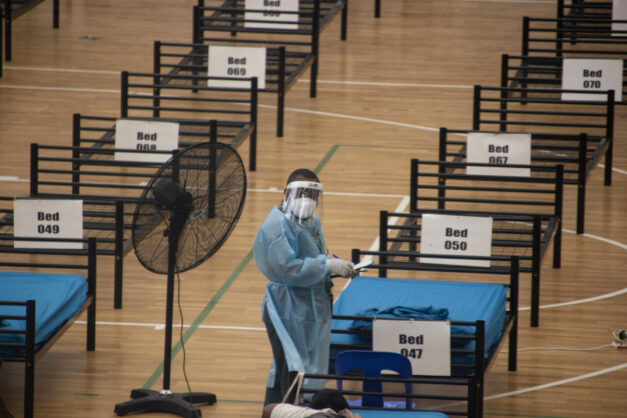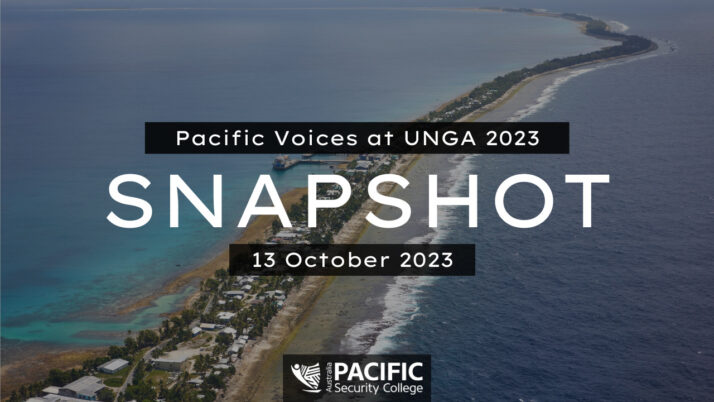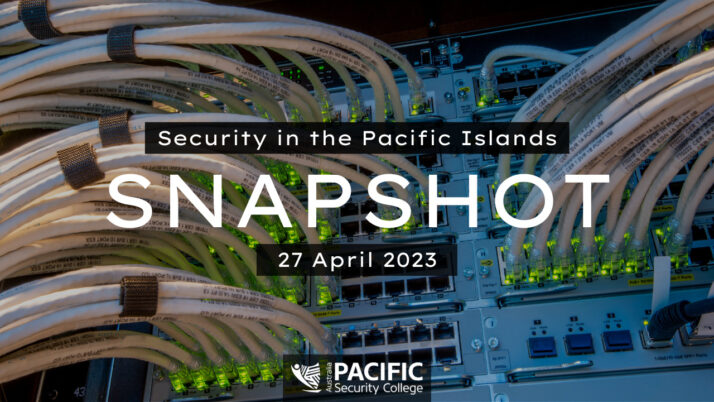Why is Delta out of control in PNG?

A nurse prepares beds for new patients at a makeshift Covid-19 hospital in Port Moresby 2021. Andrew Kutan / AFP
The Papua New Guinea Government needs to take decisive action to stop the spread of COVID-19, Elizabeth Kopel writes.
A recent Delta variant outbreak is having devastating impact on Papua New Guinea (PNG). Whilst governments around the globe have struggled to manage the variant, this outbreak has been made worse by low compliance with COVID-19 prevention protocols and extremely low rates of vaccination.
By the 1 November 2021, just over 315,000 of the country’s eight million people had been vaccinated, leading many asking why the vaccination take-up has been so low and how the situation could be improved.
Prior to this outbreak, the government had done an effective job of managing the spread of COVID-19. In March 2020, the virus was first detected in the country and the government was decisive in implementing a nationwide lockdown for several months. While this swift action was largely able to prevent the virus’ spread, it had severe social and economic consequences. That experience provided valuable lessons for the government.
With the onset of the 2021 wave of the Delta variant, the approach shifted to one of selective measures, seeking to maintain as much normalcy as possible. This has meant that businesses were permitted to continue operating and few restrictions have been placed on people’s lives, whilst officials have simply encouraged people to comply with COVID-19 protocols and emphasised the need for vaccination.
However, in practice this approach has had little effect on Delta variant’s spread. A number of interrelated factors contributed to stymie the efforts of government and the health care system.
The primary issue has been a lack of government decisiveness, who thus far have provided no clear direction and conflicting messages. On the one hand, it said that vaccination is not mandatory in the hope that more and more people will eventually choose to get vaccinated. On the other hand, it is permitting employers to introduce the ‘no jab no job’ policy.
Employers, including those in the public sector, have a responsibility to provide a safe working environment for all workers. Therefore, many insist on employees getting vaccinated or show a negative test result upon entry each day. This has led to confusion, frustration and widespread protest by workers who claim that their democratic rights are being infringed upon. Conversely, the right to not be vaccinated risks the safety of others.
Also contributing to the outbreak are widespread anti-vaccination campaigns and protest marches, which have drawn huge crowds in Port Moresby and other centres. These protests have provided the ideal conditions for the virus to spread, and have also been marked by harassment of community health workers and vaccination teams. It is even more confusing for the public when some of the anti-vaccination campaigners are trained health professionals.
Much of this anti-vaccine propaganda may be politically motivated. The public gatherings and protest marches are allegedly often fuelled by individuals with an interest in using the vaccination agenda as a platform to gain popularity for the upcoming national elections in 2022.
This is compounded by the influence of some church leaders, who have associated the vaccine with the biblical mark of the beast and discouraged members from getting vaccinated.
Social media has also played a key role in spreading anti-vaccination propaganda, with news of some vaccinated people dying being widely circulated. As a result, unfounded fears are preventing many people from getting the jab.
Perhaps one of the least appreciated issues contributing to the low vaccination rates, however, is inappropriate messaging and poor dissemination of information. PNG’s literacy rate is only 63 per cent, which limits people’s ability to understand and process information regarding COVID-19 and vaccines.
This has been made worse by the fact that much of the information available in the community is highly technical and often delivered in English, which is not understood by the majority of people. This concern was echoed by protesters across the country, arguing that they do not know enough about what COVID-19 does to the body and the advantages and disadvantages of vaccination. That leaves many people vulnerable and open to influence by anti-vaccination campaigners.
In response to the above issues, there are many possible paths leaders can take to facilitate an increase in the uptake of vaccination.
First, they should conduct sustained nationwide awareness campaigns. Of course, with limited resources, it is difficult to conduct large-scale awareness activities. However, officials could make better use of existing community organisations and networks such as mainstream churches, women’s groups and other non-government organisations to disseminate accurate COVID-19 information. These groups are particularly important as they will be able to reach remote rural parts of the country, where the government has less of a presence.
Perhaps the most important step the government can take is to ensure that this information is available in Tok Pisin. It is essential that virus and vaccine information reaches PNG’s rural population, many of whom are semi-literate or illiterate.
Information dissemination needs a holistic, whole of government approach and requires provincial health authorities to engage with all key stakeholders. This means reaching beyond current efforts to fully engage with District administrations, churches, NGOs, schools, and local community leaders to reach people at the ward level across the country.
Finally, officials must use the National Pandemic Act 2020 to take legal action against individuals who instigate violence and disrupt the administration of vaccines. It is also vital that they introduce tougher penalties for offences against the administration of vaccines.
PNG’s efforts to effectively address COVID-19 are currently hampered by a range of factors, and policymakers must refocus their attention and take strong steps to control the Delta variant. If they do not, the nation will suffer the consequences for many years to come.
Elizabeth Kopel
This article was originally published on Policy Forum.
Leave a Reply
More Stories

Security Snapshot - 13 Oct 2023
Pacific Security Snapshot: Pacific voices at the United Nations
In this special edition of the Pacific Security Snapshot, we look at the key issues raised by Pacific leaders at the recent United Nations General Assembly, including climate change, reform to multilateral institutions and ocean health. “These challenges might be inconvenient for large economies – but I can assure the climate impacts already at our…

Security Snapshot - 1 May 2023
Pacific Security Snapshot | 27 April 2023
The security stories shaping the region ➣ PIF eyes bolstering Pacific Island Countries’ cyber defences ➣ Australia releases its Defence Strategic Review ➣ Plan ANZAC signed ➣ United Kingdom Foreign Secretary visits the region ➣ Marshall Islands signs bilateral agreements with Taiwan ➣ Pacific Prevention Summit in Fiji discusses gender equality ➣ Vanuatu mitigating coconut…






